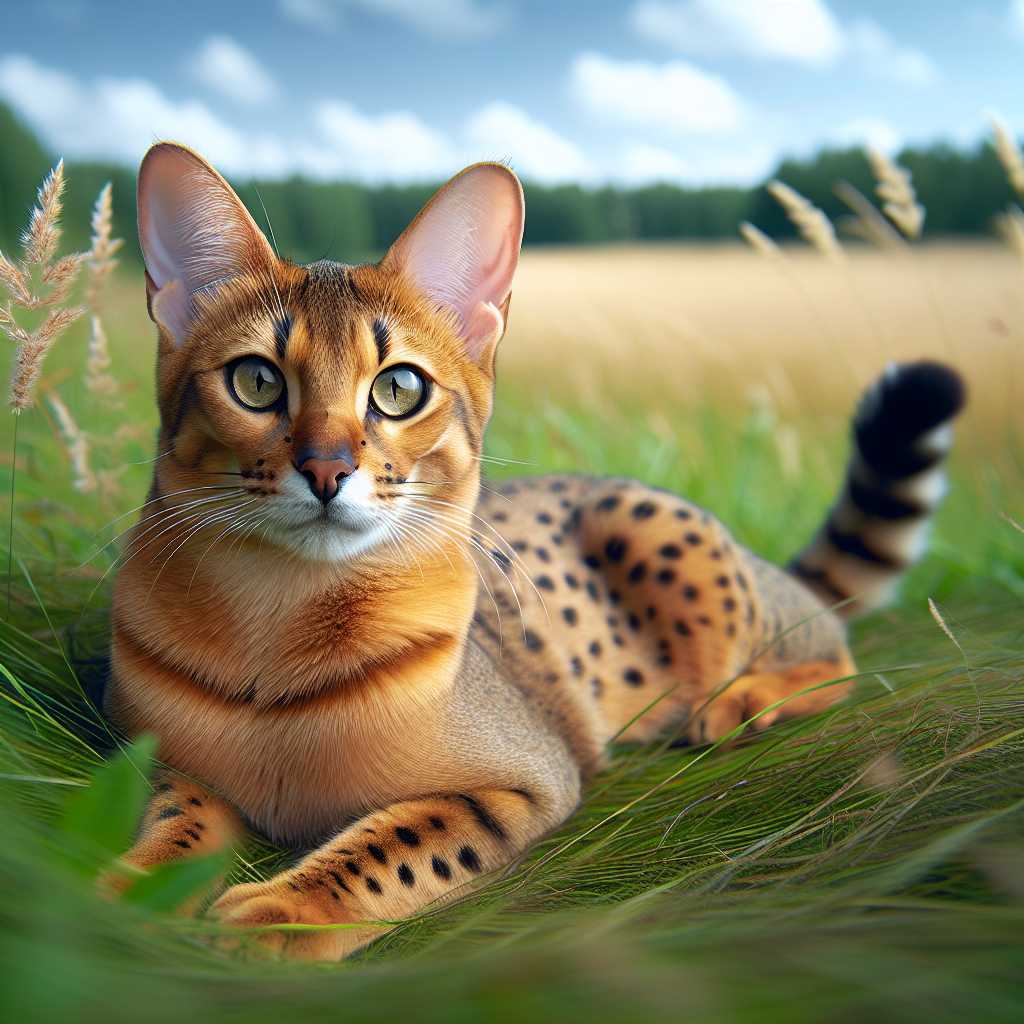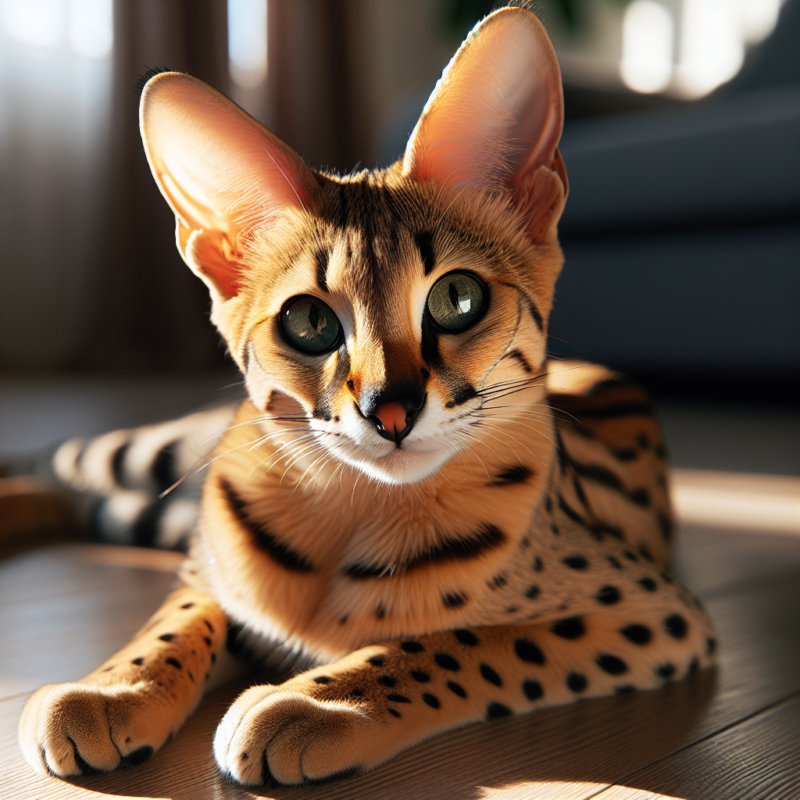About Savannah Kittens
f3 savannah cat
f3 savannah cat
The History and Origin of the F3 Savannah Cat
The F3 Savannah cat is a unique and exotic breed that has gained popularity in recent years. With its striking appearance and playful personality, it’s no wonder that many people are drawn to this breed. But where did the F3 Savannah cat come from? In this article, we will delve into the history and origin of this fascinating feline.
The F3 Savannah cat is a hybrid breed, meaning it is a cross between a domestic cat and a wild African Serval. This hybridization was first attempted in the 1980s by a breeder named Judee Frank. She wanted to create a domestic cat with the exotic look of a Serval, but with a more manageable size and temperament. Her efforts resulted in the first Savannah cat, named Savannah, who was born in 1986.
Savannah was a cross between a male Serval and a female Siamese cat. She had the distinctive spotted coat of a Serval, but with a smaller and more domesticated frame. This first-generation hybrid was named F1, and it was the starting point for the development of the F3 Savannah cat.
The F1 Savannah cats were bred with domestic cats to create the F2 generation, and then again with domestic cats to produce the F3 generation. This process was repeated until the F3 generation was achieved, which is considered the first generation of Savannah cats that are suitable as pets. The F3 Savannah cat is at least three generations removed from the Serval, making it 12.5% Serval and 87.5% domestic cat.
Is F3 Savannah kitten a Breed?
The F3 Savannah cat was officially recognized as a breed by The International Cat Association (TICA) in 2001. However, it wasn’t until 2012 that the F3 Savannah cat was accepted for championship status, meaning it could compete in cat shows. This recognition and acceptance by TICA helped to increase the popularity of the F3 Savannah cat, and it is now one of the most sought-after breeds.
The F3 Savannah cat is known for its distinctive appearance, which is a combination of its wild Serval heritage and domestic cat features. They have a tall and lean body, with long legs and a small head in proportion to their body. Their coat is short and can come in a variety of colors, including brown, silver, and black. The most striking feature of the F3 Savannah cat is its large, rounded ears, which are a trademark of the breed.
In addition to their unique appearance, F3 Savannah cats are also known for their playful and energetic personalities. They are highly intelligent and require a lot of mental and physical stimulation to keep them happy. They are also very social and enjoy being around their human companions, making them great pets for families.
The F3 Savannah cat is still a relatively rare breed, and as such, they can be quite expensive. The cost of an F3 Savannah cat can range from $2,000 to $5,000, depending on the breeder and the quality of the cat. It’s important to do thorough research and only purchase from reputable breeders to ensure the health and well-being of your F3 Savannah cat.
Characteristics and Personality Traits of F3 Savannah Cats

F3 Savannah cats are a unique and fascinating breed that has gained popularity in recent years. These cats are a hybrid breed, resulting from the crossbreeding of a domestic cat and a serval, a wild African cat. The F3 designation refers to the third generation of this hybrid breed, with each subsequent generation being more domesticated and closer in appearance to a domestic cat. In this article, we will explore the characteristics and personality traits of F3 Savannah cats.
One of the most striking features of F3 Savannah cats is their appearance. They have a tall and slender build, with long legs and a small head in proportion to their body. Their coat is short and can come in a variety of colors, including brown, silver, and black. However, what sets them apart is their distinctive spotted or marbled pattern, inherited from their serval ancestors.
In terms of size, F3 Savannah cats can range from medium to large, with males typically being larger than females. They can weigh anywhere from 10 to 20 pounds, making them a relatively large breed of domestic cat. This size, combined with their athletic build, gives them a graceful and agile appearance, similar to their wild ancestors.
How Do Savannah Kittens Differ?
Aside from their physical appearance, F3 Savannah cats also have unique personality traits that make them stand out from other domestic cat breeds. They are known for their high energy levels and love for play and exploration. This is due to their serval heritage, as servals are known for their hunting abilities and need for physical activity. As such, F3 Savannah cats require plenty of mental and physical stimulation to keep them happy and healthy.
Despite their wild ancestry, F3 Savannah cats are known to be affectionate and social with their owners. They form strong bonds with their human companions and enjoy being around them. However, they may not be as cuddly as other domestic cat breeds, as they have a more independent nature and may not always seek out physical affection. This is not to say that they do not enjoy being petted and loved, but they may prefer to do so on their own terms.
Another interesting personality trait of F3 Savannah cats is their intelligence. They are highly intelligent and curious, always looking for new things to explore and learn. This makes them easy to train and teach tricks, similar to dogs. They also have a knack for problem-solving and can figure out how to open doors and cabinets, making them quite the mischievous and entertaining pets.
It is important to note that F3 Savannah cats may not be suitable for everyone. Due to their high energy levels and need for stimulation, they may not do well in a sedentary or small living space. They also require a lot of attention and interaction from their owners, so they may not be the best choice for those who are away from home for long periods.
Caring for and Training Your F3 Savannah Cat: Tips and Tricks
The F3 Savannah cat is a unique and exotic breed that has gained popularity in recent years. These cats are a cross between a domestic cat and a wild African Serval, resulting in a stunning and intelligent feline. However, with their wild ancestry, caring for and training an F3 Savannah cat can be quite different from a regular domestic cat. In this article, we will discuss some tips and tricks for properly caring for and training your F3 Savannah cat.
First and foremost, it is important to understand the nature of the F3 Savannah cat. These cats are highly active and require a lot of mental and physical stimulation. They have a strong prey drive and love to climb, jump, and play. Therefore, it is essential to provide them with plenty of toys, scratching posts, and perches to keep them entertained and prevent destructive behavior.
In terms of diet, F3 Savannah cats have specific nutritional needs due to their wild ancestry. They require a high-protein diet, similar to what their wild counterparts would eat. It is recommended to feed them a diet that consists of at least 50% protein, such as raw or high-quality wet food. It is also important to monitor their food intake and not overfeed them, as they can easily become overweight.
Grooming an F3 Savannah cat is relatively easy, as they have short, low-maintenance coats. However, they do shed quite a bit, so regular brushing is necessary to keep their coat healthy and reduce shedding. Additionally, it is essential to trim their nails regularly and clean their ears to prevent any infections.
Training F3 Savannah Kittens
When it comes to training, F3 Savannah cats are highly intelligent and can be trained to do various tricks and behaviors. However, it is crucial to start training them at a young age and use positive reinforcement techniques. These cats respond well to treats and praise, so be sure to reward them when they exhibit desired behaviors. It is also important to be patient and consistent with training, as these cats can be stubborn at times.
Socialization is another crucial aspect of caring for an F3 Savannah cat. These cats are highly social and thrive in a household with other pets and humans. It is recommended to introduce them to new people and animals at a young age to prevent any potential aggression or fearfulness. Additionally, providing them with plenty of playtime and interaction will help keep them mentally stimulated and prevent any destructive behavior.
One of the most important aspects of caring for an F3 Savannah cat is providing them with a safe and secure environment. These cats are known to be escape artists and can easily jump over fences or open doors. Therefore, it is essential to have a secure outdoor enclosure or keep them indoors at all times. It is also recommended to microchip your F3 Savannah cat in case they do manage to escape.
In terms of healthcare, F3 Savannah cats are generally healthy and have a lifespan of 12-20 years. However, they may be prone to certain health issues such as hypertrophic cardiomyopathy and dental problems. It is crucial to schedule regular check-ups with a veterinarian and keep up with vaccinations and preventative care.
conclusion
In conclusion, caring for and training an F3 Savannah cat requires a bit more effort and attention compared to a regular domestic cat. However, with proper care, these cats can make loving and loyal companions. It is essential to understand their unique needs and provide them with a stimulating and secure environment. With patience, consistency, and positive reinforcement, you can have a well-behaved and happy F3 Savannah cat in your home.

